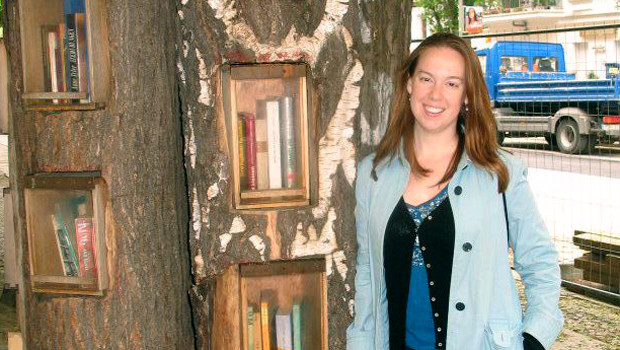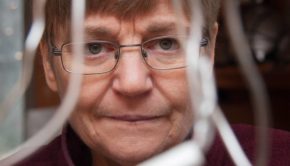
Studio Artist Spotlight: Aimee Fullman
Can you tell us a little bit about how you got started as an artist, and some of your history?
Growing up, I was very active in the arts primarily through dance with secondary interests in music (as an oboist in band and orchestral) and choirs. From the age of 6, I trained extensively in ballet, jazz and modern and took tap, belly dance, improv, contemporary, character, ballroom, liturgical and anything else I could get my hands on along the way. Choreography was a great interest for me and in college I pursued dance as a minor. I was an avid reader from a very young age and so this also led me to dabble in creative writing and poetry from time to time. However, it is still very difficult for me to call myself an artist and there were large parts of my creative self that I left behind over the years that I am just now starting to reclaim. And no one was more surprised than I to realize a few years ago that, through my career, I had become in many ways, a part-time professional writer.
Where do you acquire a lot of your inspiration from?
I find each of my works manifests differently. Some of my work is very conceptual or technical and some is very deep-felt and an examination of or an expression of a specific relationship or feelings. Personally, I find that exposure to other cultures, ideas, art and nature are a vital part of my personal and artistic growth. I have participated several times through Spark (sometimes using a pseudonym) where artists provide an inspiration piece and then a response work based on the exchange. I have found this to be a fruitful way to create because it feels more like a conversation and there is a limited time frame which can be a nice change from pursuing (sometimes in a seemingly never-ending journey) a specific and often elusive vision where I feel more like I am a conduit that a work comes through.
What are some of your most memorable points in your artistic journey?
In a general sense, there have been periods where I felt I had to make choices that put my creative aspirations and needs on the backburner. Some of these choices I regret and some I do not. As a result, I have quit dance and then returned more times than most people attempt to quit smoking. I don’t recommend this as there is much you lose in terms of technique and ability, but in my case other life experiences provided a more mature sense of self and reflections I can bring back whenever I am able to take it up again. Walking away from something that is so inherently a part of who I am forced the realization that this is something I cannot live without; something important to do even if I do it badly and periodically which is a complete reversal from the pursuit of daily perfection one is trained with.
A specific memorable point concerns a situation where I was burned very badly on a writing-related project due to plagiarism and reinterpretation of a work I was very committed and emotionally tied to which was followed by abuse and vicious character slander by the same individual. Attempting to defend the integrity of the work and those it represented the best way I could under the circumstances and feeling I had failed miserably, was one of the hardest trials of my life. It was a long climb up to start to be able write again in any way (professionally or personally) and some of the damage still lingers. The turning point for me was rediscovering “The Artist Way” through an artist group here at Convergence. I found it to be so valuable that I participated twice and my second group of women still meets about every 6 weeks to support each other in our artistic endeavors and personal lives.
You do a lot of work overseas in international arts and cultural policy. What exactly does a day in the professional life of Aimee look like for you?
Every day is different and that is the beauty of it for me. I have been very fortunate to be able to work on projects that I feel are significant and can make a difference for individuals and society by emphasizing the importance of international cultural relationships, mutual trust and cultural expression. In any given day, I do a fair amount of project management, research, writing, outreach, strategic planning and policy advising. This year with a new position at a UK university in an online program, I am able to return to teaching and working with students directly again and I am really looking forward to that.
How does having a workspace among artists help you professionally, and how does it inspire you to get more active in your creative life?
Making a commitment to this workspace was a very big step for me. I like to do things a bit under the radar and so this somewhat public declaration that I might consider myself an artist remains challenging. However, I love having a space where I can write and create separate from my home office. Although, I do work on all types of writing in the space, I have found that this delineation between professional and personal creation has been essential. I love coming in and seeing other creative works manifesting around me. I deeply support the vision that Convergence has regarding arts and community and because my professional work is related to this, coming here reminds me of these connections in a direct and personal way. Working amidst four other artist presences has affected me by giving me another perspective so that every time I now pick up a pen for policy research or am thinking about impact and evaluation, I wonder, “how could this affect them?” Also, two of the artists in this studio, Cheryl and Theresa, organize an open monthly arts activity here in the space and I come as often as my travel schedule permits. I find this a great way to learn about other community art opportunities and to be inspired in artistic techniques and practices that I haven’t necessarily embraced or tried in my own work.
How has Convergence been able to manifest some of your visions?
My mother was a Methodist minister and I left the church when I went to college. Over time, though, I have become a very spiritual person and for me, personally, creation and faith walk hand in hand; both are about learning to listen, making a commitment to something that can never be fully tangible and wrestling with tough questions towards hopefully a greater understanding of interpreted truth. Although I tend to create alone, I want to feel connected to something bigger than myself and to give back to my community with the gifts that I have. For all these reasons Convergence is a wonderful fit. However, the importance of having an affordable space to play creatively in with no expectation of output cannot be overvalued.
What projects are you working on currently?
I have a few larger themed projects I have been starting to work on that I think will probably come together in the next few years. In the meantime, I have a couple of more craft-related projects I am pursuing that act as stress-relief. Professionally, I am working on several very ambitious arts-related projects as a research and arts administrator that are related to social impact and the arts and international cultural relations.
Aimee Fullman is an independent research, communications, policy and management consultant specializing in the creative sector, international engagement/cultural relations and cultural diversity whose work has been presented on five continents. A long time lover of the arts with a twenty-year intensive background in dance and ten years of involvement in classical music and musical theater, she now combines her interests in international relations, arts and culture in communities and sustainable business models towards more meaningful engagement for her clients.



